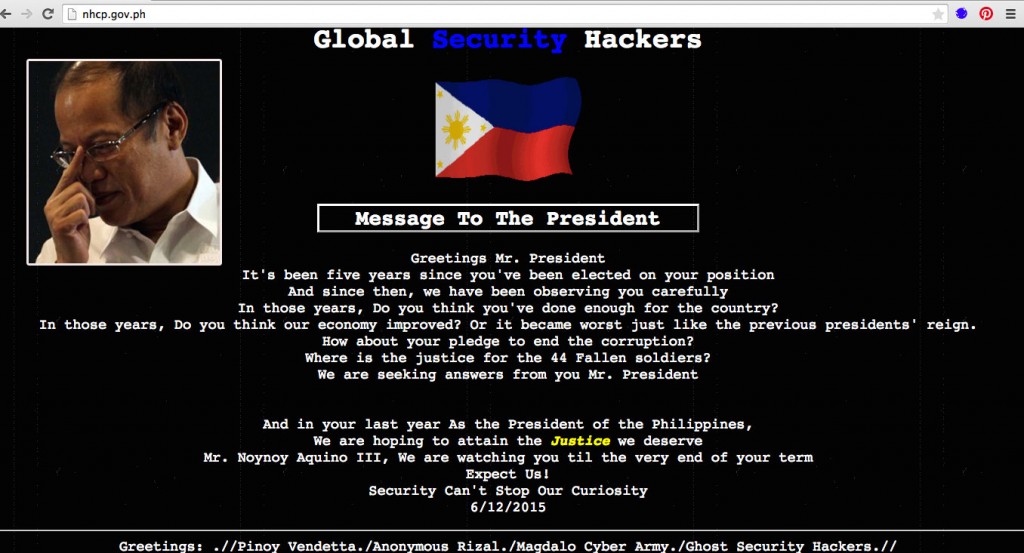Hackers on Friday defaced the website of the National Historical Commission of the Philippines (NHCP), challenging President Benigno Aquino III on Independence Day if he “has done enough for the country” in the five years of his administration.
The hackers identified themselves as Pinoy Vendetta, Anonymous Rizal, Magdalo Cyber Army and Ghost Security Hackers.
“Do you think you’ve done enough for the country? Do you think our economy improved? Or it became worse just like the previous Presidents’ reign (sic)? How about your pledge to end corruption? Where is the justice for the 44 fallen soldiers (sic)? We are seeking answers from you Mr. President,” the groups said in a message posted on the website.
READ: LOOK: Hackers deface gov’t website twice, leave message for Aquino
The groups were apparently referring to the 44 slain Special Action Force (SAF) commandos, members of the Philippine National Police, who were killed in an encounter with Moro Islamic Liberation Front rebels in Maguindanao province last January after the SAF head failed to adhere to the ceasefire mechanisms as part of their counterterrorism operation.
The groups told President Aquino that in his last year as President, “We are hoping to attain the justice we deserve.”
“Mr. Noynoy Aquino III, we are watching you till the very end of your term. Expect us!” they said.
What security?
They also said, “security can’t stop our curiosity.”
As of 2 p.m. on Friday, the NHCP website had been restored.
Sought for comment, deputy presidential spokesperson Abigail Valte said: “Whatever the message, we cannot condone the hacking of websites. The freedom of speech or a citizen’s right to redress of grievances must be exercised with responsibility.”
For his part, Communications Secretary Herminio Coloma Jr. said “the country’s economic gains have been recognized by the international community as the fruits of good governance under the Aquino administration.”
He also said the Department of Justice (DOJ) has been working on the case of the SAF 44 to bring “to the bar of justice those responsible for the deaths of the SAF commandos.”
“The government is determined to pursue inclusive growth and justice for all, and would not be deterred by those who resort to dysfunctional acts,” Coloma said.
Hacking throwback
The website of the NHCP was one of the 38 government websites hacked on Nov. 2, 2013.
The hackers, who identified themselves as Anonymous Philippines, hacked these websites to demand for the abolition of the graft-ridden Priority Development Assistance Fund (PDAF).
Among the sites hacked then were the websites of the Office of the Ombudsman, Philippine National Railways, Insurance Commission and Philippine Embassy in Seoul.
On Nov. 13, 2013, the National Bureau of Investigation arrested hacktivist known as “Reaper” and “anonymousbutuan” from the Internet shop where he was employed in Butuan City. Rodel Plasabas was suspected of being part of Anonymous Philippines.
Anonymous
Months prior to that, in August 2013, Anonymous Philippines also defaced at least 30 government websites in the light of their antipork protests.
On its Facebook page, Anonymous Philippines claimed that the websites of the Office of the President, Senate, Bureau of Customs (BOC), Department of Finance, Department of the Interior and Local Government, Department of Agrarian Reform, Department of Public Works and Highways, Bureau of Internal Revenue, Bureau of Treasury, Department of Energy, Department of Education and Department of Environment and Natural Resources were affected.
The same group also defaced the website of the Office of the President in March 2013 for “mishandling” the Sabah crisis caused by the revival of the Sultanate of Sulu’s claim on Sabah.
CyberCrime Prevention Act
The “hacktivists”—from the term hacktivism that fuses hacking and social activism—also struck on
Jan. 15, 2013, the scheduled day for oral arguments in the Supreme Court for Republic Act No. 10175, or the CyberCrime Prevention Act of 2012, a law that protesters say threatens freedom of speech.
Websites of BOC and the television show “Eat Bulaga,” were defaced by hacker group Private X, a member of Anonymous Philippines. Also hacked was the website of the Quezon City Police District.
Gov’t websites
A day earlier, the group hit several government websites, including those of the National Food Authority, National Maritime Polytechnic, Cebu Port Authority and the Municipality of Jose Panganiban (formerly Mambulao), to draw attention to the oral arguments at the high tribunal.
In September 2012, the websites of the Bangko Sentral ng Pilipinas, Metropolitan Waterworks and Sewerage System, the American Chamber of Commerce, the Philippine Anti-Piracy Team and the Agusan del Sur website were hacked by Anonymous Philippines as the cybercrime law took effect. Those of the Official Gazette, Senate and NBI were either defaced or suffered denial-of-service attacks.
Cybercrime law suspension
The Supreme Court extended indefinitely its order suspending the implementation of the cybercrime law in February 2013.
Last March, the website of Police Security and Protection Group, a support unit of the Philippine National Police, was defaced by a hacker calling himself “Leon HDZ” who took over the site and posted a photograph of a faceless man in a suit on the homepage.
Source: Inquirer Archives
RELATED STORIES
Hackers attack gov’t sites, call for justice for slain SAF men
Gov’t websites defaced; hackers urge Filipinos to join protest
